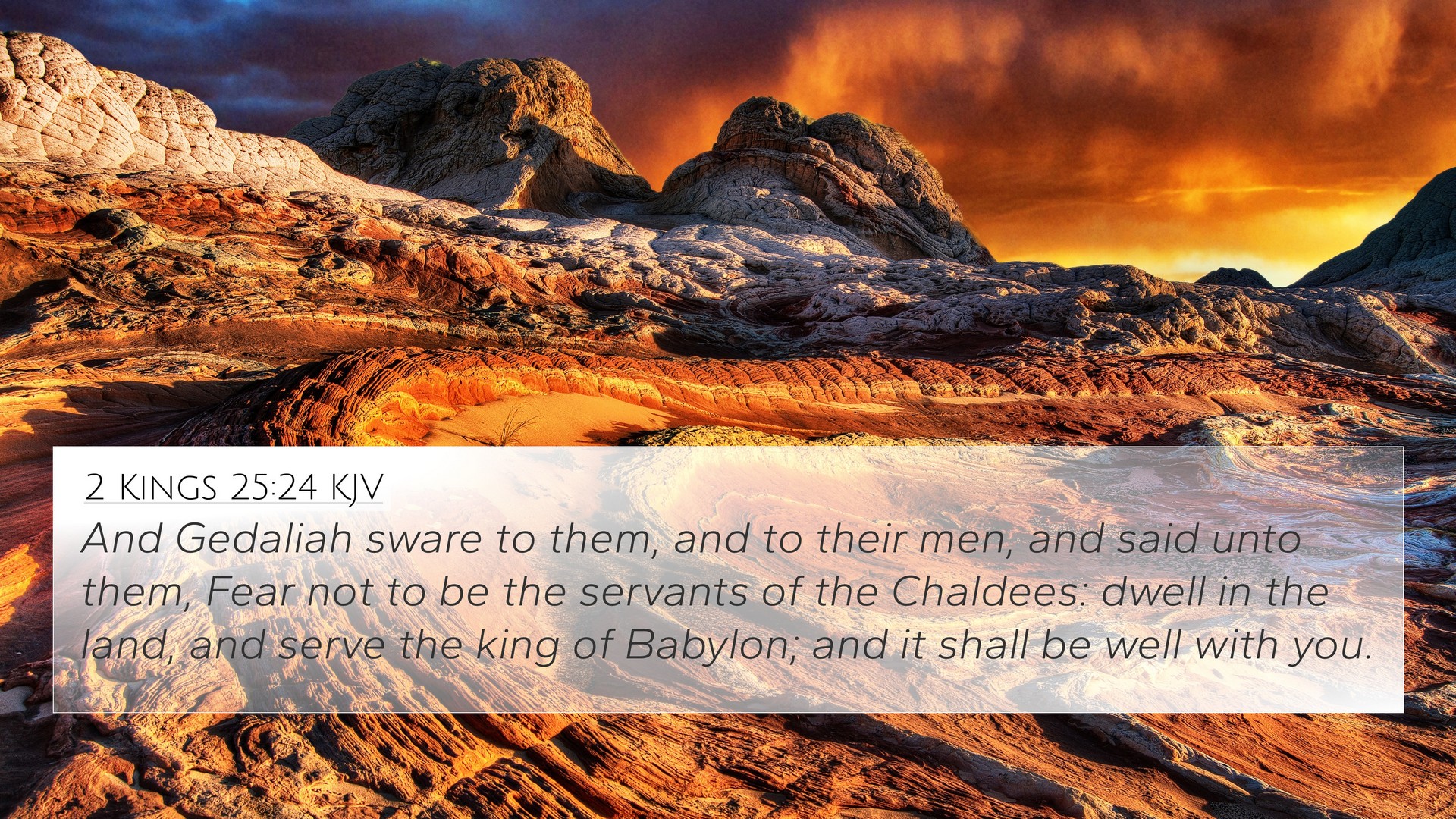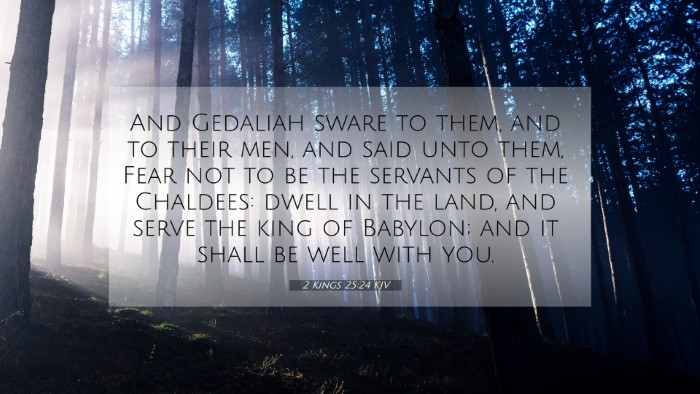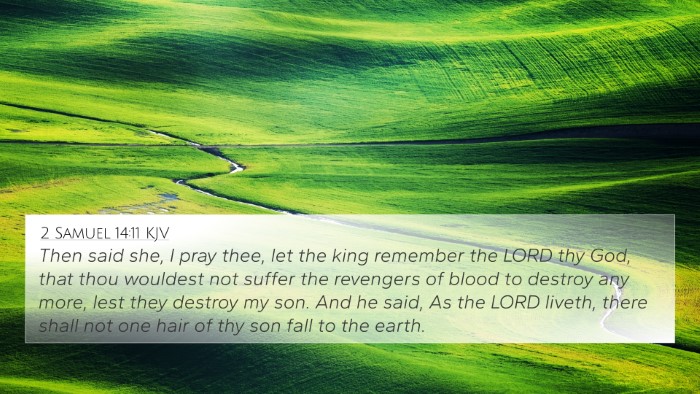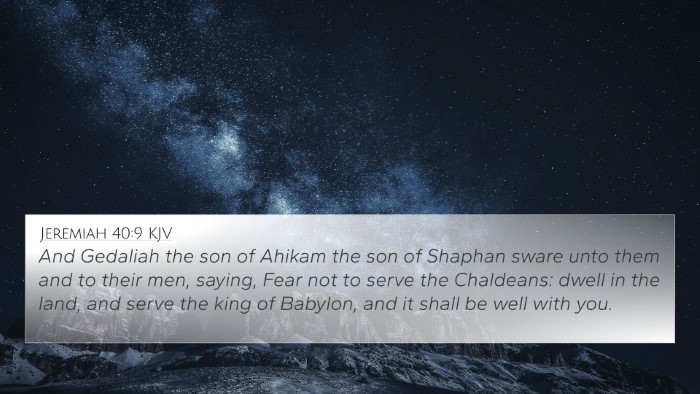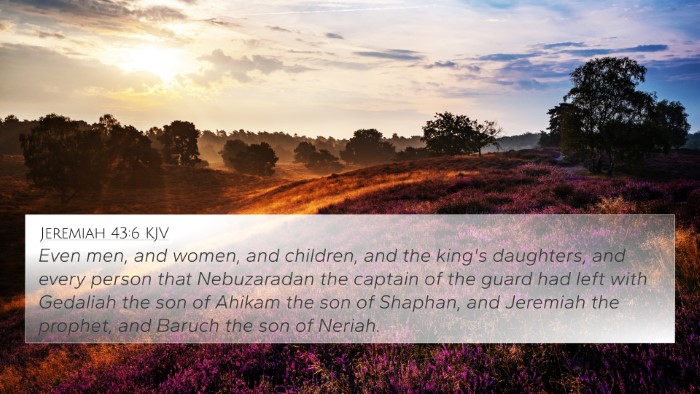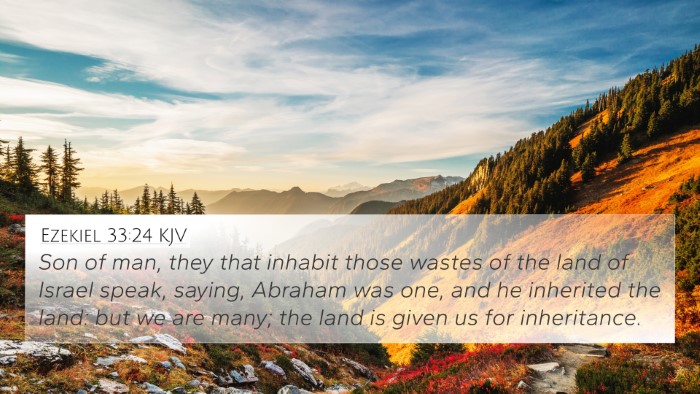Understanding 2 Kings 25:24
Verse: "And Gedaliah the son of Ahikam, the son of Shaphan, swore unto them, and to their men, saying, Fear not to be the servants of the Chaldees: dwell in the land, and serve the king of Babylon, and it shall be well with you." (2 Kings 25:24)
Summary of Meaning
This verse captures a moment of reassurance during a time of upheaval following the fall of Jerusalem. Gedaliah, appointed as governor of the remnant of Judah, implores the people to relinquish their fears and to serve the Babylonian king. The message is not only about submission to foreign authority but also an invitation to peace and stability amidst chaos.
Insights from Public Domain Commentaries
-
Matthew Henry:
Henry emphasizes the significance of Gedaliah's role as a mediator during a tumultuous period. He suggests that his swearing in the name of the Lord highlights a divine endorsement for the people to serve Babylon, suggesting it is part of God's providential plan. Gedaliah's encouragement reflects a deeper theological truth about God's sovereignty in the midst of national calamity.
-
Albert Barnes:
Barnes views Gedaliah's announcement as crucial for the stability of the people. He interprets the call to serve Babylon as a practical step toward preserving their lives and heritage. Barnes also notes the importance of Gedaliah's lineage, connecting him to faithful ancestors, which would encourage trust and unity among the people.
-
Adam Clarke:
Clarke discusses the socio-political implications of Gedaliah's leadership. He mentions that fear often leads to rebellion, but Gedaliah sought to quell unrest by promoting loyalty to Babylon. Clarke also highlights the historical context, suggesting that Gedaliah’s message would have been seen as counter-cultural and a difficult pill to swallow for those longing for independence.
Cross-References
To deepen understanding, it is beneficial to explore the related themes and narratives in the Bible. Here are some important cross-references to 2 Kings 25:24:
- Jeremiah 40:9-10: Gedaliah's appointment as governor and his promise of safety.
- Jeremiah 42:6: The people's commitment to Gedaliah's leadership.
- Isaiah 39:6-7: Prophecy regarding the Babylonian captivity.
- Ezekiel 17:12-20: A parable concerning the fate of Jerusalem and its leaders.
- 2 Kings 24:5-7: The backdrop of Judah's subjugation under Babylon.
- Daniel 9:2: Acknowledgment of the prophecy of seventy years of desolation.
- Psalm 137:1-4: An expression of sorrow in captivity, linked with Gedaliah’s time.
Thematic Connections and Interpretations
Gedaliah's call to peace draws thematic parallels across different scriptures, highlighting how themes of fear, submission, and divine sovereignty connect throughout the Bible:
- Fear and Trust: Compare with Philippians 4:6-7, where believers are told not to be anxious.
- Submission to Authority: Refer to Romans 13:1-2, discussing God's ordination of authorities.
- God's Plan in Adversity: Linked to Jeremiah 29:11, which teaches about God's plans for future hope.
- Restoration: Assured in Isaiah 61:4, discussing rebuilding what was lost.
Tools for Bible Cross-Referencing
Readers may utilize various tools to enrich their study of cross-references:
- Bible Concordance: A helpful resource to locate verses related to specific themes or words.
- Cross-Reference Bible Study: Techniques used to explore links between scriptures, enhancing comprehension.
- Bible Cross-Reference Guide: A structured method to trace thematic connections and parallels between verses.
- Comprehensive Bible Cross-Reference Materials: Reference collections providing extensive insights into scripture relationships.
Conclusion
The message in 2 Kings 25:24 serves as a reminder of faith in God's sovereignty even in difficult circumstances. Gedaliah's role emphasizes the necessity of leadership, trust, and hope during national despair. Cross-referencing with related scriptures can provide a deeper contextual understanding, enhancing individual biblical studies.
